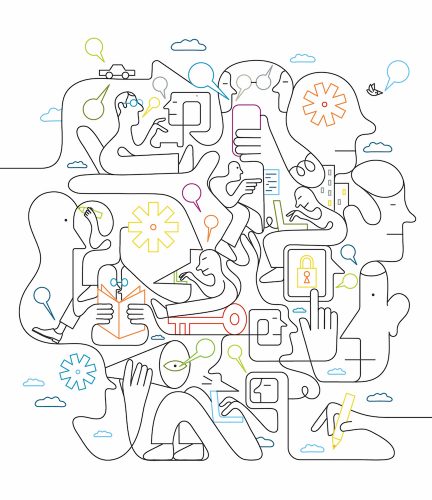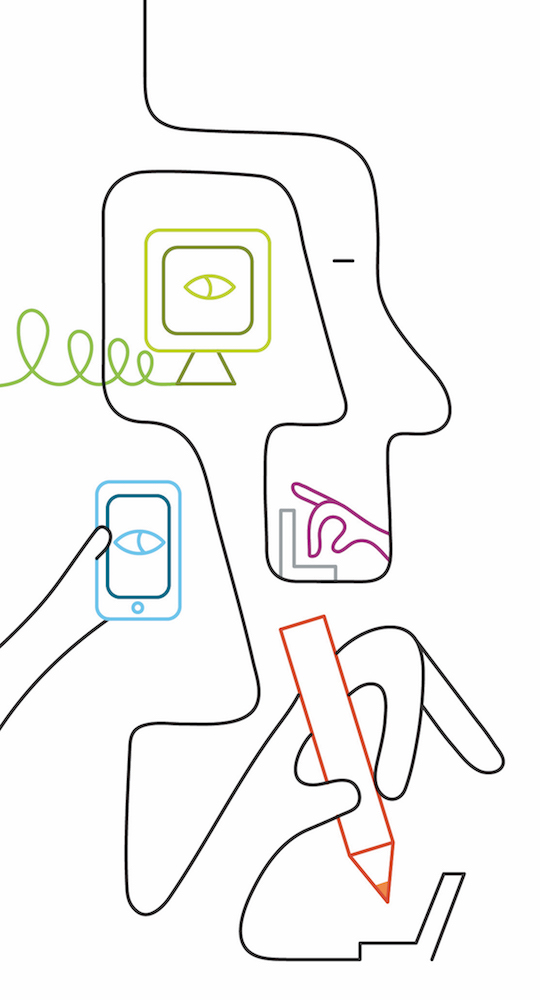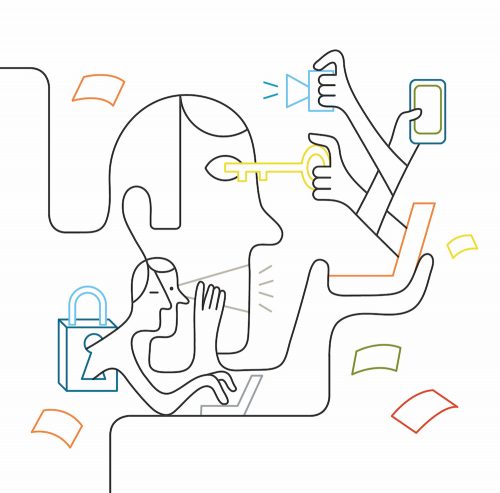A New Line of Thinking
By Matt O'DonnellIllustrations by Jonathan Calugi
Participants:
Keith Shortall ’82
Maine Public news editor
Clayton Rose
Bowdoin College president
Michele “Shelley” Cyr ’76, P’12
Associate dean for academic affairs for biology and medicine, Brown University-Alpert Medical School, and current chair of Bowdoin College board of trustees
Liz McCormack
Bowdoin College dean for academic affairs
Irfan Alam ’18
Government and legal studies major, economics minor, and student representative to the executive committee of the board of trustees
Ron Brady ’89
CEO and cofounder of Foundation Academics, and Bowdoin trustee
Ben Painter ’19
Government and legal studies major, visual arts minor, and student representative to the executive committee of the board of trustees

Technology is so integrated into our daily lives that many of us barely contemplate it. We don’t think about how our GPS determines when to tell us to turn left; we just know we don’t have to ask for directions as long as we have a street address. But technology is changing more than our daily routines—it is affecting industry and our economy, influencing our politics and our points of view, and changing medicine, transportation, and nearly any field you can think of. We know it changes the way we teach. But how does it change the liberal arts? Should it? President Rose and the Bowdoin board of trustees used their February retreat meetings to focus specifically on these issues by heading to Silicon Valley, where they, the student and faculty representatives to the board, and the senior officers met with leaders from Apple, Coursera, Google Brain, IDEO, Microsoft, Stanford, and Uber. Maine Public Radio’s Keith Shortall ’82 spoke with Rose and some of those who attended about the impact of the trip on the way they think about a Bowdoin education.
Keith: Clayton, it was your idea to take this group to Silicon Valley. Why did you think that was important?
Clayton: The first thing is the work in the world of Silicon Valley, not as a place but as an idea: the new economy, technology, entrepreneurship. It is changing everything we do, some for good, some for bad, and some to be determined. It isn’t a magical place where all things are great; it’s a really important place that is driving change in the world we are in. And I felt and feel that it’s really important for our board, which has the responsibility for thinking about the long-term health, vibrancy, and mission of the College, to spend a little time soaking in the experience of what goes on out there, not with a view that we’ll come back on Monday morning and have three things to do that we didn’t have on Friday, but to inform a lot of discussion—and ultimately decisions—that we will make about the future of the College.
Keith: Let’s start with the bad.
Clayton: I think the best example is what we’re seeing with what happens to our information— what we voluntarily surrender and if we should. What’s surrendered without our knowledge and understanding, what’s being done with that information, and how is it being used for good and for ill in society? What affirmative decisions are we taking as a society, a global society, around all of that? How consciously are we engaging with technology and the implications of it? I think what we’re learning is: not much, right? There are a handful of people who really drive all that, and the rest of us are kind of moving along behind it. We had the benefit of having a wide range of interesting folks engage with us. We met with a really thoughtful senior engineer who works in artificial intelligence, and he expressed—I’ll caricature it a little bit—one of the pervasive strains of thought in Silicon Valley, which is, “Our job is to build it faster, better, stronger.” It’s a technological and engineering challenge. And almost immediately, the board began asking questions: “What are the social implications of that? What are the ethical implications?” and, “Yes, we get the technological power of all this, but what kind of decisions should be made? Who’s making them? How do you think about them in the work you’re doing?” And that ended up being a thread through everything that we talked about and every person we talked to.
Keith: This speaks to this idea that humanities will play a big role in shepherding, as you say, the ethics but also the bigger thinking around how, for example, AI is used and should be used.
Clayton: Absolutely right. The humanities are an essential part of helping us to consider the world we want to live in and how we want to use all this. But it’s full-out, full disciplinary engagement. It’s not simply saying we’ve got computer science on the one hand, and if we throw some philosophy at them, then all is good.
Keith: Shelley, what was your takeaway, as one who envisions a future for Bowdoin and a direction and sort of a game plan.
Shelley: When Clayton presented this, I thought it was interesting but didn’t really see how it would play out. One of the most important messages for me was a reaffirmation of how now, perhaps more than ever before, there’s huge value in the liberal arts education that Bowdoin can provide. In terms of that informing the work we do as a board, I think it made it clear how important it is for us to think about the work we are doing around the question “What are the knowledge, skills, and creative dispositions that a Bowdoin graduate should have going forward?” And how does what’s going on in Silicon Valley really inform what we do at Bowdoin?
“What’s surrendered without our knowledge and understanding, what’s being done with that information, and how is it being used for good and for ill in society?” —Clayton Rose
Liz: Technology is changing both how and what we teach. It impacts how we teach by providing powerful tools for teaching and enhancing learning. It impacts what we teach because these tools are changing the way we interact with each other and the world, including how we acquire knowledge, so we need to provide opportunities to investigate, evaluate, and critique the impact of various technologies on individuals and societies. We know we teach critical thinking and the ability to critique and lead in an ethical fashion. Are we also thinking about ways we involve the curriculum to develop students’ abilities to discover new knowledge with these tools and to create these tools themselves?
Irfan: I’d like to second the notion of reaffirmation. When Benny and I were doing the readings that were offered to us as an education on artificial intelligence, et cetera, there was an article talking about the intersection of a liberal arts education and some of this work that we were going to be seeing. And I specifically remember almost laughing to Ben on the plane, being like, “Oh my gosh, here we go again.” It’s as if only people with liberal arts educations are able to contextualize this work and find these commonalities. And I’m thinking, these people in Silicon Valley are so smart—they’re going to be able to do this too; we don’t have anything that special. But some of the people we met, I’m confident in saying that I don’t think they really were able to contextualize some of that work and understand the implications—like running a race but not knowing what happens when you cross the finish line. Knowing what happens for you, but not what happens to everyone else. I think that what we do here is going to be more important than it ever has been.
Keith: Ron, what was your takeaway as a trustee?
Ron: I absolutely echo how different it felt to be there. It felt as different for me, as an East Coast-raised Bowdoin alum, as it might feel for me to be in a foreign country or in the rural South or in a sort of straight-up suburban Midwestern place. It was really, really different. And what it helped me see better is the role that we at Bowdoin play in preparing students to enter Silicon Valley or any of these other places and make a contribution to the common good there. I think Bowdoin can make important contributions; being out there made me see that. Irfan really hit the nail on the head.

Keith: You anticipated one of my questions. We couldn’t be much farther away here in Brunswick from Silicon Valley geographically. And culturally, historically, we’re rooted in Puritan New England. How much of this will be changing the curriculum or changing the skills and knowledge sets that faculty bring, and how much is creating a culture that provides students with the comfort level and skills they need to contribute quickly?
Ron: There was a question that we discussed while we were out there, that the coin of the realm is an engineering background and, obviously, that’s not what we do. I believe very deeply that we can make contributions. The question is, how welcome will our folks be without that engineering background? I don’t think we should adjust what we do, but it’s a question of making sure that we get access to the conversations.
Keith: So, is getting the first few people into Silicon Valley the key?
Clayton: I’d say we’re well past that. We have a big group of people at all levels. Reed Hastings [’83] is kind of the touchstone at the top, but we have a huge number of alumni out there. We did a panel discussion there last September with five young alumni: two computer science majors, an English major, an anthropology major, and a government and legal studies major—all of whom are working in the Valley now.
Keith: Ben, do you agree Bowdoin is preparing students for a role in the emergent technology realm?
Ben: I know some conversations indicated that, just to get in the door, to be part of the conversation, you have to have a certain amount of background knowledge about really advanced math. But at the same time, we met with someone with a liberal arts degree high up in Apple, so I think it depends on the company and the context.
Clayton: I think there’s a really interesting debate that goes on out there between engineers and non-engineers about how relevant engineering is. If you look at a number of folks who have really powerful positions—Benny alluded to Phil Schiller [P’17] at Apple, who is not an engineer. It’s been pointed out to me that the leaders of most of the companies in the first generation had no engineering background. Steve Jobs was not an engineer, right? So, the interesting question is, what do you need to bring to bear? Are there things you need to understand about coding and what it means, what it looks like—are there touch points that we ought to have, versus full-bore engineering, which may not be what we do? They themselves debate the question. I think it’s part of the battle about who should have influence.
Keith: And do you think that will change over the next five to ten years?
Clayton: I think that’s an open question. We’re actually doing a separate body of work right now. Shelley referred to it when she said “knowledge, skills, and creative disposition,” where we have a group of faculty, staff, students, and trustees looking at that over the long term. My guess is some of this would seep into that. Is it important for students to have some sensibility and understanding of what coding and what the backbone of coding means and how to have a conversation with someone who’s an engineer even if you’re not an engineer? Interesting question, one we’ll probably explore. That’s a different question than whether we should be an engineering school—a profoundly different question.
Keith: Shelley and Ron, you both expressed confidence that Bowdoin’s well positioned to help its graduates prepare for this realm. What keeps you up at night, though?
Shelley: We’ve touched on what skills our graduates need in order to enter into any fields that they may want to pursue and trying to figure out how you dial in those engineering, coding, technical skills that might be necessary and important for their future careers, versus keeping the liberal arts education pristine. Obviously, we’re also grappling with the cost of a Bowdoin education and the trajectory it’s on. And we’re looking at families who are trying to consider what their student is going to be able to do with a Bowdoin education. What kinds of jobs will be available to them? I think we’re always trying to figure out how can we best prepare Bowdoin graduates for productive lives that give them good value and meaning.
Ron: Are there times when we may miss the mark, when we might think what we’re doing is right, but the marketplace is telling us that a whole bunch of other things are important? Are we preparing students for the world that will really exist in the future or just for the world that we want, or I want, to exist in the future? That’s what I think about.
“Are we preparing students for the world that will really exist in the future or just for the world that we want to exist in the future?” —Ron Brady ’89
Liz: I am less worried that technology will challenge the relevancy or importance of what we do. Our model of education has seen change and disruption many times before, and our purpose and our mission remain as important as ever. Our strategies may change, but our record of adaptation is strong. I’m confident that technology is another development we can understand and leverage to serve our mission.
Keith: You also witnessed how Silicon Valley is rethinking physical space. What did you take away from those discussions that might be applied here?
Ben: Looking at the design of Apple’s new “spaceship” campus got me thinking about how our library is designed and the recent improvements there, like increasing collaborative space, space where conversations are really encouraged. And also how to integrate technology into the spaces themselves, so students are really using technology to explore what they are talking about or working on. That’s started in the library, and I hope that continues.
Shelley: What I took away from the discussions around space is that form follows function, and space can really dictate how people work together or don’t work together. We’ve certainly been thinking about that as we build the new Roux Center.
Keith: Clayton, your idea to do this sort of suggests a concern that there was a danger of not making a real effort to sort out strategically what the relationship is going to be going forward. Everyone here seems to be saying, “Well, I think we’re in a pretty good position. I worry a little bit.” Do you have a bit more serious concern about whether Bowdoin’s doing enough?

Clayton: Bowdoin is in as strong a position as we have ever been in our entire history. Reputationally, the quality of our students, quality of our faculty, our curriculum, financially, on every dimension we are an exceptional liberal arts college and as strong as we’ve ever been. So that affords us the opportunity to think proactively about how we remain an exceptional liberal arts college and what it is we have to do over the medium- to longer term to do that. We are not in an existential crisis. We’re not fighting big fires every day. That’s a really privileged position to be in. It’s from that perspective that I think about all of this and all the things that we’re doing. I think all great institutions can get blinders; you can get caught up in your history and your traditions and who you are, and that’s true along many dimensions.
Irfan: One of the people we met with at the very end of our trip made the comment that technology is a liberal art. That’s what his argument was. And I would imagine some trustees would disagree. But is computer science a liberal art? We have a computer science department now, and we made that shift because we saw that people needed this skill. What does that mean for technology? Can we have something similar? We wouldn’t generally be afraid of that idea just because of our tradition.
Keith: You guys were the lucky ambassadors to the student body. What do you say when someone says, “Hey, how was the trip?”
Ben: I’m grateful the trustees are having these conversations. We always talk about getting out of the Bowdoin bubble, and I’d just say these trustees are thinking so far outside of the bubble, not just one year ahead, not just ten years ahead, but fifty years ahead—having these conversations about the future of humanity and how Bowdoin interacts with it.
Irfan: I think some Bowdoin students might have the idea that trustees are out of touch with current students and their concerns. But the reality is that they deeply want Bowdoin students to succeed. They want Bowdoin students to be leaders who are conscious technologists. They want this all to happen.
Keith Shortall ’82 is news director at Maine Public, where he is primary editor of Maine news and feature stories aired on Maine Public Radio. He also hosts and produces the weekly political roundtable Across the Aisle and is occasional host for the daily call-in news program Maine Calling.
This story first appeared in Bowdoin Magazine, spring/summer 2018.